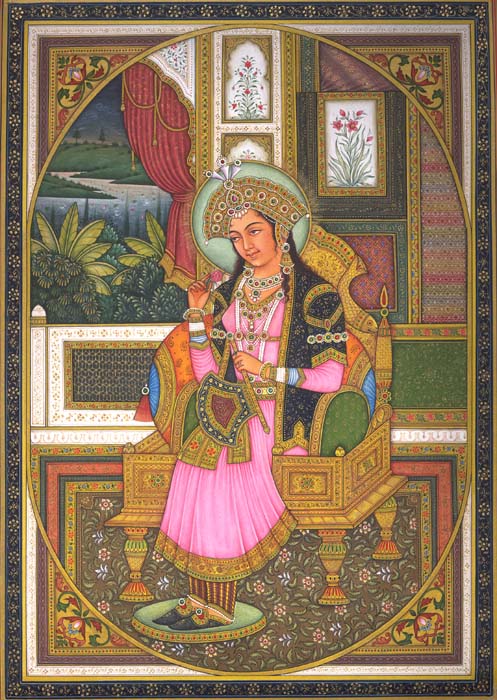March means Women’s History month, and yesterday, March 9th, was International Women’s Day. From the start of Islam through the present day, Muslim women have influenced the course of history, advanced the standard of women’s roles, and pushed the envelope of human possibility past the closed doors in front of them.
Here is a look at a group of 10 distinguished Muslim women throughout history, who have redrawn the boundaries of “Muslim” and of “woman’ in influencing the following 10 spheres: Activism, Religion, Athletics, Cinema, Arts, Diplomacy, Mysticism, Politics, Literature, and Empire.
elan’s selections span pre-20th century to modern day - some may surprise you in their accomplishments, while others are a celebration of the achievements we as Muslims know and love. And as usual, we turn to you, our readers to ask - who else would you list, and why?
PRE-20TH CENTURY
Religion: Khadijah
The first convert to Islam was Khadijah, Prophet Muhammad’s (PBUH) first wife. Her support of her husband immediately following his life-changing revelation was instrumental to infant Islam’s survival starting in 600 AD. Several years senior to Muhammad (PBUH) and his boss, she was often consulted in matters concerning the burgeoning religion, and was one of his most trusted advisors. Her model faith and support have made her a paradigm for Muslim women and wives.
Additional Influencers:
Other women whose influence and support greatly aided Muhammad (PBUH) and whose example is often popularized in the Muslim world are Aishah bint Abu Bakr, the Prophet’s (PBUH) youngest wife, and Fatima, Muhammad’s (PBUH) daughter.
Arts: Walladah bint Mustakfi
Walladah (c. 1001 - 1080 C.E.), the daughter of a caliph of Islamic Spain, exhibited and advanced the standard of tolerant, vibrant multi-culturalism that marked the era of Islamic Spain. Upon inheriting her father’s fortune, Walladah, known for her progressive spirit, went on to host gatherings for both women and men writers, artists and musicians, and was well known for her own poetry. The incarnation of the zeitgeist of Islamic Spain, Walladah’s sponsorship of the intellectual and artistic cornerstones of her time reflects the large-scale efforts, especially by women Muslims in Islamic Spain, to endow the arts and intellectual institutions with funding, support, and their own personal contributions.
Mysticism: Rabia al Basri
The 8th Century former slave became known for her devout nature, absolute aceticism including lifelong celibacy and near-total lack of material possession, and commitment to the ideal of God as a Beloved of the human being, a philosophy she revived and popularized during her life, and thanks to powerful poetry by the Sufi Farid Al-Din Attar, after her death as well. The Sufi trademarks of worshipping out of love of God and not out of fear of God and of an ascetic pratices were embodied by Rabia, whose exemplary life is often used to illustrate these virtues through anecdote and verse.
Empire: Mumtaz Mahal
Mumtaz Mahal (1577 - 1645) the Indian empress at the height of the Mughal Empire in India, Mumtaz Mahal may be most well-known for inspiring the most famous structure in the world, the Taj Mahal. The beloved wife of the Emperor Shah Jahan is fabled to have been the ideal empress, supporting her husband by loyally travelling with him, spreading her graces of her beauty and good nature, bearing him fourteen children, and finally, inspiring the creation of one of the greatest achievements in world architecture, the Taj Mahal, the tomb where she and Shah Jahan remained joined, even in death.
Additional Influencers:
Other female empresses of India, like Empress Nur Jahan, wife of the emperor Jahangir, wielded more power during their reign. But Mumtaz Mahal’s influence, while not explicitly political, has left an indelible mark on the world.
Other female empresses of India, like Empress Nur Jahan, wife of the emperor Jahangir, wielded more power during their reign. But Mumtaz Mahal’s influence, while not explicitly political, has left an indelible mark on the world.
20TH CENTURY
Athletics: Nawal El Moutawakel
Morocco’s track & field star, and the first Arab woman to earn an Olympic Gold medal (1984, 400 meter race), El Moutawakel is one of a handful of female Muslim athletes who has pinnacle success and gone on to encourage the integration of more female athletes into the games. As one of only 15 female members of the International Olympic Committee (135 total members), El Moutawakel was a pioneer in female Muslim Olympic competition.
Morocco’s track & field star, and the first Arab woman to earn an Olympic Gold medal (1984, 400 meter race), El Moutawakel is one of a handful of female Muslim athletes who has pinnacle success and gone on to encourage the integration of more female athletes into the games. As one of only 15 female members of the International Olympic Committee (135 total members), El Moutawakel was a pioneer in female Muslim Olympic competition.
Additional Influencers:
Two other recent Olympic contenders who have also joined the IOC are Rania Elwani, a swimmer from Egypt (competed 1992, 1996, 2000), and Princess Haya of Jordan, equestrian competitor (the first Arab woman to do so). Of course, the Olympics aren’t the only place for competition. Boxer Laila Ali, daughter of the icon Muhammad Ali, has made headlines (and endorsement records) in the US. And younger Muslim women are starting to take the world stage, such as Indian tennis player Sania Mirza.
Two other recent Olympic contenders who have also joined the IOC are Rania Elwani, a swimmer from Egypt (competed 1992, 1996, 2000), and Princess Haya of Jordan, equestrian competitor (the first Arab woman to do so). Of course, the Olympics aren’t the only place for competition. Boxer Laila Ali, daughter of the icon Muhammad Ali, has made headlines (and endorsement records) in the US. And younger Muslim women are starting to take the world stage, such as Indian tennis player Sania Mirza.
Politics: Benazir Bhutto
The first female Muslim to be elected as a head of state, Bhutto has been a controversial figure from the time of her father Zulfikar Ali Bhutto’s execution in 1979, to her two terms as Prime Minister of Pakistan (1988 - 1990; 1993 - 1996), to her exile from the country on accusations of corruption, to her eventual return to Pakistan and subsequent assassination in 2007. Given her status as a reviver of Pakistani politics fighting against the supreme state powers self-awarded to the President Pervez Musharraf, Bhutto became an icon for millions of followers of political revival and democratic angst, qualities still evoked by her memory in Pakistan. In 2008, Bhutto received a posthumous UN Human Rights Prize.
Additional Influencers:
Though some Western countries, including the US, have yet to elect a female leader, Bhutto, and her Muslim sister contemporaries in Bangladesh, Khaleda Zia (first female Prime Minister of Bangladesh, 1991-1996), and Sheikh Hasina Wajed (current Prime Minister of Bangladesh) have often been touted as examples of female leadership and autonomy in the democratic Muslim world.
Though some Western countries, including the US, have yet to elect a female leader, Bhutto, and her Muslim sister contemporaries in Bangladesh, Khaleda Zia (first female Prime Minister of Bangladesh, 1991-1996), and Sheikh Hasina Wajed (current Prime Minister of Bangladesh) have often been touted as examples of female leadership and autonomy in the democratic Muslim world.
21ST CENTURY
Activism: Surayya Pakzad
The Afghani activist and recipient of the 2008 International Women of Courage Award founded the Voice of Women Organization, which provides Afghan women with counseling, job training, shelters from battery/abuse, and legal services. Just one of many women helping define the new Afghanistan in the wake of the fall of the Taliban, Pakzad’s role is as dangerous as it is crucial to Afghanistan’s advancement; she, and other prominent female officials in Afghanistan, often face death threats in the line of duty. Activism in the Muslim world is a recent buzz topic.
Additional Influencers:
Other women who have recently made large strides include, Shirin Ebadi, the Iranian human rights activist who became the first Muslim woman to win a Nobel prize (Nobel Peace Prize 2003). Other women whose activism requires daily courage and grit include, Norah al-Faiz who appeared in Time Magazine’s Top 100 Most Influential People of 2009, who was recently appointed as the first woman minister in Saudi Arabia’s history (Deputy Minister for Women’s Education).
Other women who have recently made large strides include, Shirin Ebadi, the Iranian human rights activist who became the first Muslim woman to win a Nobel prize (Nobel Peace Prize 2003). Other women whose activism requires daily courage and grit include, Norah al-Faiz who appeared in Time Magazine’s Top 100 Most Influential People of 2009, who was recently appointed as the first woman minister in Saudi Arabia’s history (Deputy Minister for Women’s Education).
Cinema: Shohreh Aghdashloo
The first Iranian woman to be nominated for an Academy Award (Best Supporting Actress, The House of Sand and Fog 2003), Aghdashloo’s acclaimed screenwork has taken her from hit TV shows like ER and Will & Grace to her Emmy-winning role in the TV movie House of Saddam (2008).
Additional Influencers:
Following fast on Aghdashloo’s awards trail, Marjane Satrapi, the Iranian graphic novelist whose bestseller-cum-hit film Persepolis was nominated for Academy and BAFTA awards in 2007, became a member of the Cannes Film festival Jury in 2006, and won the Cannes Jury Prize in 2007. Beyond these contemporary film figures, Muslim women also have a place in screen history, particularly in India where such stars as Madhubala (Mughal-e-azam, 1960) and Nargis (Mother India, 1957) are still seen as some of the all-time icons of Indian cinema.
Following fast on Aghdashloo’s awards trail, Marjane Satrapi, the Iranian graphic novelist whose bestseller-cum-hit film Persepolis was nominated for Academy and BAFTA awards in 2007, became a member of the Cannes Film festival Jury in 2006, and won the Cannes Jury Prize in 2007. Beyond these contemporary film figures, Muslim women also have a place in screen history, particularly in India where such stars as Madhubala (Mughal-e-azam, 1960) and Nargis (Mother India, 1957) are still seen as some of the all-time icons of Indian cinema.
Diplomacy: Queen Noor
Perhaps the first Muslim woman to gain prominence on the world stage as a bridge between supposedly “clashing civilizations” Queen Noor of Jordan, widow of the late King Hussein of Jordan, is an American-born Princeton graduate, author, diplomat, UN figure (president of the UN World Colleges Movement) and often-consulted expert on Middle Eastern politics who has played a crucial role in balancing the world’s view of the Muslim world. She herself is a convert (upon marriage to King Hussein), and her rhetoric of collaboration, reconciliation, and accessibility has taken Jordan’s monarchy to a new level of affability and relevance.
Additional Influencers:
Queen Noor’s traditions have been further bolstered by her contemporary, Queen Rania of Jordan. Both known for their stylish ways and diplomatic natures, these Queens of Jordan have done wonders balancing the regal with the real.
Queen Noor’s traditions have been further bolstered by her contemporary, Queen Rania of Jordan. Both known for their stylish ways and diplomatic natures, these Queens of Jordan have done wonders balancing the regal with the real.
Literature: Azar Nafisi
The bestselling author of Reading Lolita in Tehran, this Iranian professor captured the hearts of millions with her accounts of the female struggle in modern-day Iran, and put a face for many on the “other” Muslim women living in so-called “states of terror.”
Additional Influencers:
The modern literary tradition in Iran did not begin with Nafisi; the female poet Farough Farrokhzad is often credited with being one of the most influential female poets of the 20th century, along with numerous other authors and poets in the Muslim world who have expressed themselves to great success through the written word.
The modern literary tradition in Iran did not begin with Nafisi; the female poet Farough Farrokhzad is often credited with being one of the most influential female poets of the 20th century, along with numerous other authors and poets in the Muslim world who have expressed themselves to great success through the written word.






















Tidak ada komentar:
Posting Komentar